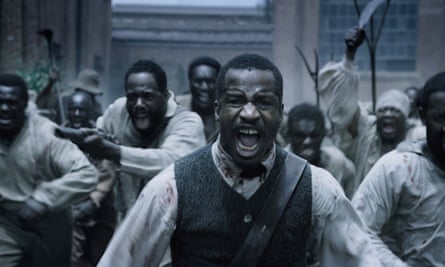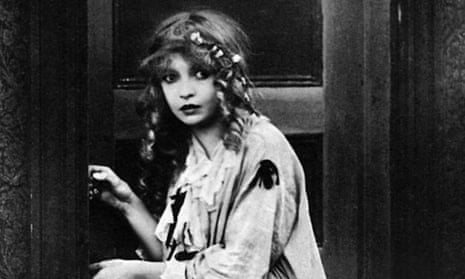Lillian Gish, the “first lady of American cinema”, starred in more than 100 films between 1912 and 1987, including greats such as Broken Blossoms and The Night of the Hunter, and pioneered many of the techniques essential to cinema acting – especially mesmerising closeups. She has a star on the Hollywood Walk of Fame, an AFI Lifetime Achievement award and an honorary Oscar. But now, more than 25 years since her death aged 99, her stock appears to have fallen. The trustees of a student union in Ohio have voted unanimously to remove the name of Gish and her sister Dorothy from a university cinema because of one film that she appeared in, the notoriously racist The Birth of a Nation.
DW Griffith’s 1915 film epic is still dangerous, perhaps increasingly so. The movie, which prompted protests from the NAACP and cinema riots on its release, praises the Ku Klux Klan and contains deeply offensive representations of African Americans in the years following the civil war. It was held responsible for a surge in KKK membership and has always had a toxic reputation, while being lauded for its technique.
In 1999, Griffith’s name was stripped from the Directors’ Guild lifetime achievement award, and there have been (so far unsuccessful) attempts to remove his name from a middle school in Los Angeles. In both situations, it’s The Birth of a Nation that is cited against him. It’s undeniable that it was a personal film for Griffith; he came from a slaveholding family and his father, “Roaring Jake”, was a Confederate officer in the civil war and a Kentucky politician. While certain of his other films challenge racism, he never apologised for The Birth of a Nation.

While silent cinema scholars have questioned Griffith’s elevated status in film history, The Birth of a Nation has become more visible in popular cinema. The past few years have seen not just the release of Nate Parker’s slave uprising drama, which borrowed the older film’s name, but growing use of clips in releases by other directors of colour. Ava DuVernay’s documentary 13th and Spike Lee’s BlacKkKlansman both feature the film heavily, and there was a “white-face” version in Justin Simien’s Dear White People. With the rise of white supremacist groups in the US, the time has come to face Griffith’s film and interrogate its legacy. For black American cinema to flourish, it may be necessary to confront and dismantle this revered text.
It was because of Gish’s association, and the cinema’s prominent display of images from the film in the cinema foyer, that members of the Black Students Union at Ohio’s Bowling Green State University campaigned for the name change. The cinema had been named after Gish and her sister Dorothy, who were born nearby, in 1976. There are currently no plans to rename it. A report by the university concluded that while there is no suggestion that the Gish sisters ever espoused racist causes themselves, Lillian never distanced herself from the film or its director, and further, she represents “the face of Aryanism” in the movie. In the future the cinema will feature a display explaining its history, the reasons for its name change and “an acknowledgment of the Gish sisters’ contributions to film history and culture”.
Film historian Joseph McBride, professor of cinema at San Francisco University, responded with outrage. “I find this action short-sighted, ignorant, and offensive,” he wrote on a public Facebook post. “Yes, Gish acted in a film that has many abominable aspects, as well as being artistically important, and she never seemed to fully understand or acknowledge the grave social problems surrounding it [but] her entire body of work should be taken into account, something we fail to do today in condemning artists for some of their actions, often doing so recklessly and thoughtlessly.”

For McBride, the decision needlessly sacrifices Gish’s legacy, and “trying to erase the past helps no one make progress”.
Critic and programmer Ashley Clark, however, welcomes the change. “I think it’s great that students’ concerns are being taken seriously and empathetically in a climate where the stakes are very high: a time when white supremacist domestic terrorism is on the rise, and when the actual president happily calls fascists ‘fine people’. These very real threats are straight out of The Birth of a Nation cultural playbook.”
Griffith’s film was endorsed by then-president Woodrow Wilson, though there is doubt that he ever, as is often claimed, said the film was “like writing history with lightning. My only regret is that it is all so terribly true.”
Feminist film historian Shelley Stamp, professor of film and digital media at the University of California, Santa Cruz, believes the name change is “quite understandable”.
“For too long the abhorrent racism of The Birth of a Nation was swept under the rug or dismissed in favour of praise for the film’s cinematic innovations,” she says. “The racism inherent in the film’s very conception, its production and its circulation can no longer be ignored. Artists like Lillian Gish, whose extraordinary performance anchors the film’s emotional centre, were complicit in this enterprise.”
Despite everything, Clark has sympathy for the actor, saying: “I understand that it might be seen as a little harsh on Gish, but her legacy will survive beyond this symbolic stripping.”
